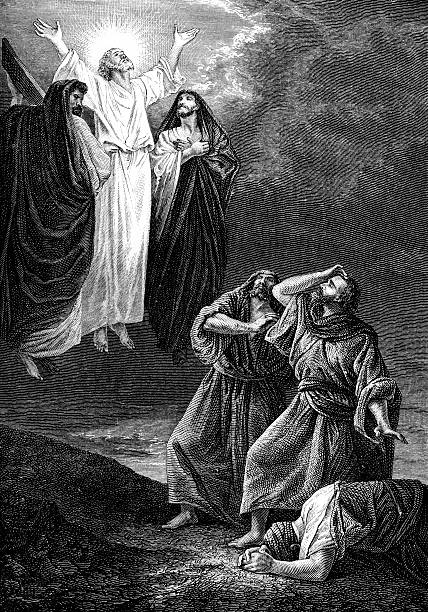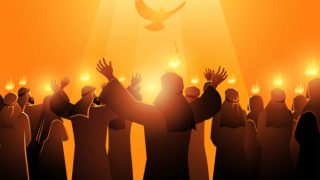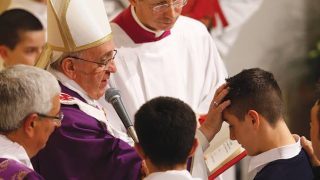
A CALL TO WITNESS THE TRANSFIGURATION
HOMILY FOR SECOND SUNDAY OF LENT, YEAR A. Readings: Genesis 12:1-4; Psalm 33; 2 Timothy 1:8-10 and Matthew 17:1-9.
The liturgy of the Lenten Season gives us a historical view of our salvation. While last Sunday was about the temptation and fall of our first parents, today’s liturgy presents to us the call of Abraham and the transfiguration event, of which we traditionally reflect on every second Sunday of Lent. Subsequently, we will reflect on Moses and the prophets. The transfiguration event gives us a glimpse of the reward that comes after every cross and it gives us courage to forge ahead especially when we begin to doubt our faith in the midst of suffering.
This transfiguration event provides us with answers to innumerable questions about our faith in Christ. It gives us a clue of eschatology by confirming the reality of heaven and the reward for the just and faithful, as all our fasting, prayers, penance, almsgiving and self-denial during this season of lent shall never go unrewarded.
In the first reading, God called Abraham, proposed a mission for him and blessed him. The Lord said to Abram, “Go from your country and your kindred and your father’s house to the land that I will show you…” In a patriarchal culture with no governmental welfare system to serve as a safety net for people in trouble, one’s family is one’s security. If you are ill or injured, your family takes care of you. So, in this periscope, God is telling Abram to let go of his security of which he has depended all his life and to trust God to provide for the future. He is requesting Abram to take the leap of faith into the darkness, a leap that many people will think reckless. If Abram abandons his family and God fails to provide, he will be in serious trouble.
Similarly, many of us have been called in our respective vocations but are still tied down to our families and possessions that we find it so hard to detach ourselves from them and attach to God. Humanly speaking, in answering our calls we want to make material provisions and security for our families and relatives or friends, which tend to hinder our commitment to serve, and practically makes it impossible for us to move to the land God will show us. Going to a land that we are not used to nor specified could cause lots of anxieties, as it expresses the fear, pains and sufferings of a missionary. Hence, we should know that when dealing with God, only faith can save us from anxiety. Due to Abram’s faith and belief in God, God revealed to him the blessing and greatness that will come to him. Similarly, Christ revealed to the disciples the glory of God that awaits those who believe in him.
The three Synoptic gospels (Matthew, Mark and Luke) place the transfiguration event immediately after Peter’s declaration of the identity of Jesus when he asked, “Who do the crowd say that I am?” and “Who do you say that I am?” after various responses, Peter said, “You are the Messiah”(Luke 9:18-20). Though, the Jewish understanding of the messiah is one that will be a conqueror, who will neither end in agony on the cross, nor suffer. With this, Christ realized his mission was at stake and must let them know his type of messiahship, the messiah that must go to Jerusalem to suffer, which is contrary to their general belief of the messiah. This became the hardest truth for them, the choice of following Christ and the cost of discipleship, to deny oneself, take up one’s cross and follow Christ.
As typical Jews who believed in the theology of retribution, they had no idea of the reward of following Christ, they were not so sure if any reward was attached to the cross of Christ. It was because of their doubt that Christ took with him Peter, James and John to the mountain. “Before them he was transfigured andhis face shone like the sun, and his garment became white as light” (v.2). This reminds us that there are many parallel between Moses in Exodus 24 and Christ at the Transfiguration on the mountain. Moses’ face shone so brightly that the people were frightened and Moses had to wear a veil over his face (Ex 34:29-35). The disciples know the Moses story and surely make this connection. Both incidents occurred on the mountain; both involve Moses; in both incidents, God spoke from the cloud and both expresses the glory of the Lord and inspire fear. In Deut. 18:15 Moses promised that God will raise up a prophet like him and in the Transfiguration, we understood Christ as the new Moses, the Son of God, and both had similar mission to set the people free from slavery and sin.
To clear the doubt of the disciples about the Messiah, Moses and Elijah had to appear to them in glory. While Matthew and Mark tells us Moses and Elijah were talking with Jesus, Luke is the only gospel that tells us of the content of their discussion, “They spoke of his exodus, which he was to accomplish in Jerusalem” (Lk. 9:31). This also provides a parallel with Moses, who led the Exodus from Egypt, and the Exodus which Moses and Elijah spoke of was the death of Jesus Christ, “which he was about to accomplish at Jerusalem” (v.31). While the Exodus from Egypt led God’s people to the Promise Land, the Exodus of Christ will lead us to the Kingdom of God and the Transfiguration event reveals the glory of God’s Kingdom to these three privileged disciples. As if that was not enough, the voice of God from the cloud said, “This is my beloved Son, with whom I am well pleased; listen to him!” (Mt 17:5).
There are some lessons attached to the transfiguration. Firstly, is that Christ is the Son of God. Secondly, good things do not come easily, so there is need for hard work and thirdly, there must be Good Friday before Easter Sunday. Invariably, no cross, no crown. St Paul in the second reading urges us to “Take your share of suffering for the Gospel in the power of God, who saved us and called us with a holy calling…” (2 Tim 1:8). Let us not set for ourselves earthly things like Peter building booths, “Our common wealth is in heaven, and from it we await a Saviour, who will transform our lowly body to be like his glorious body” (Phil. 3:20).
Like Abraham and the disciples, we have been called by God and are urged to listen to his Son through the Transfiguration event. He tells us that the place of the cross is central in our salvation and as heaven remains a gift for all, we must purchase it with the price of the cross. Let us not reject the cross like Peter who wanted a crown without cross but examine ourselves during this season of lent to see if our Christianity is the type without cross or if we carry our crosses alone or implore Christ to carry it with us. In view of this, I will invite you to solemnly sing the hymn of the old rugged cross, written by George Bennard in 1912:
“On the hill far away, stood the old rugged cross, the emblem of suffering and shame, and I love that old cross where the dearest and best for a world of lost sinners was slain. So I’ll cherish the old rugged cross, till life’s trophies at last I lay down, I will cling to the old rugged cross, and exchange it some day for a crown.” Peace be with you!
Happy Sunday!
Fr. Ken Dogbo, OSJ










